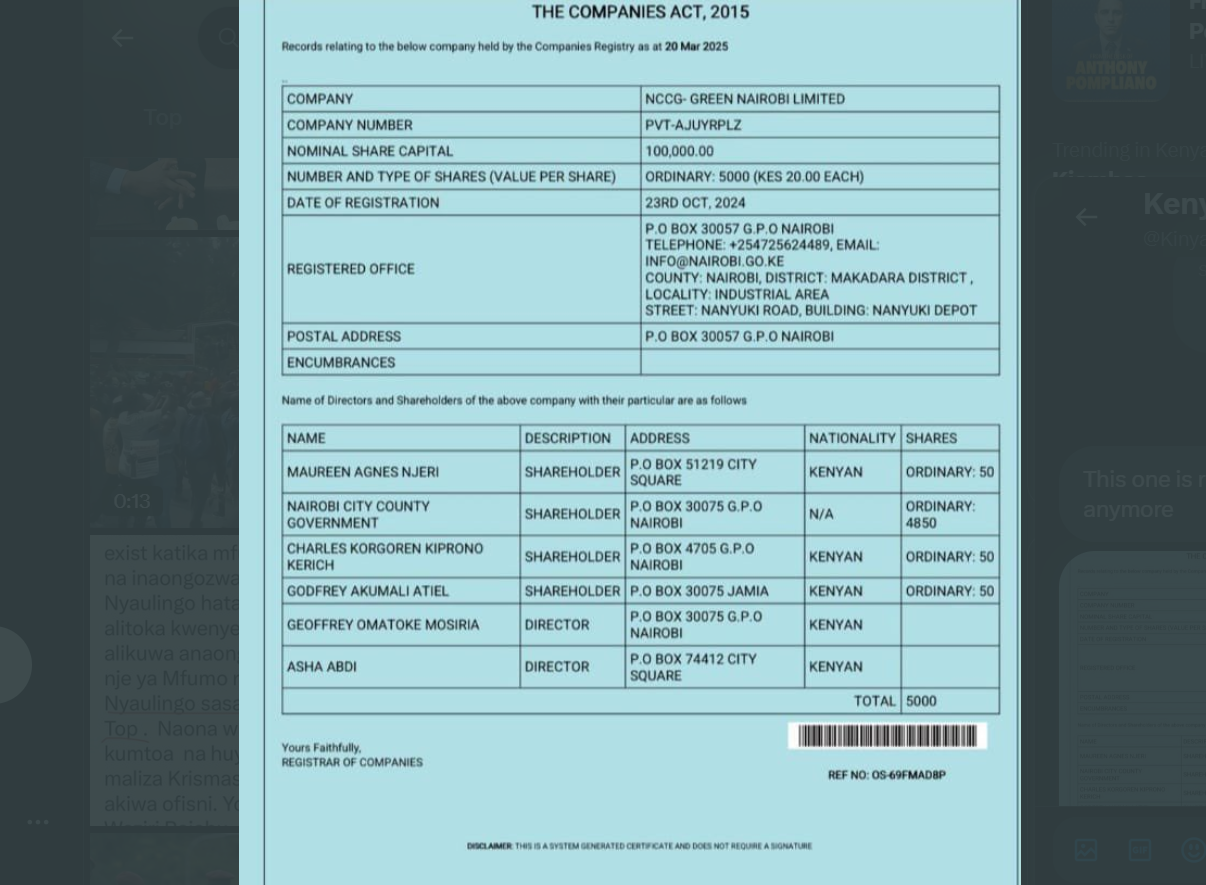Investigations
Sakaja Waste Firm Deal: County Officials in Suspicious Company Setup Summoned

The stench from Nairobi’s garbage is no longer just from the piles of uncollected trash choking our streets—it’s now coming straight from the corridors of power.
Governor Johnson Sakaja’s administration, already facing criticism for incompetence and empty promises, is neck-deep in a scandal that reeks of corruption, nepotism, and gross abuse of office.
A newly registered private firm, Nairobi Green Limited, is at the storm’s center, supposedly created to handle solid waste in the capital.
But fresh revelations show that the company’s shareholders and directors include sitting county officials, raising red flags about legality, transparency, and conflict of interest. This is not a cleanup; it’s a dirty, dangerous game.

Nairobi Green was set up quietly, behind closed doors, by people who now stand to benefit financially from contracts they can influence. It’s a classic fox-guarding-the-henhouse situation. [Photo: Courtesy]
Sakaja Waste Firm Deal: Nairobi’s Dirty Garbage Scandal Exposed
The Nairobi County Assembly Committee on Environment has blown the lid off a secretive plan involving senior county officials, who are now accused of illegally registering a waste management company while still serving in public office.
Documents from the Registrar of Companies expose the true faces behind Nairobi Green Limited:
-
Maureen Njeri, the CECM for Environment, holds equal shares.
-
Charles Kerich, the CECM for Finance, is another major shareholder.
-
Godfrey Akumali, the County Secretary, also appears on the shareholder list.
-
Geoffrey Mosiria (Chief Officer for Environment) and Asha Abdi (Chief Officer for Finance and Economic Planning) are listed as directors.
This private company, set up while these individuals were still drawing salaries from taxpayers, is now being positioned to take over Nairobi’s entire waste management sector.
Shockingly, Nairobi County itself is listed as the majority shareholder with 4,850 shares, giving this suspicious operation a cloak of legitimacy.
But when the Assembly Committee summoned them to explain how and why this company was created, most failed to show up.
Instead of transparency, we are getting arrogance. Instead of answers, the people of Nairobi are getting more trash—both literal and political.
Assembly Summons Ignored As Officials Defy Oversight
On April 16, 2025, the Nairobi County Assembly Clerk issued summons to CECM Maureen Njeri and Chief Officer Geoffrey Mosiria, demanding their personal appearance on April 23 before the Committee on Environment and Natural Resources.
The committee seeks to understand how a company involving active public servants was established under a veil of secrecy.
The letter clearly states that non-attendance will attract consequences under Section 27 of the County Assembly Powers and Privileges Act, 2017. But even with legal threats looming, there has been little cooperation.
Kariobangi North MCA Joel Munuve has led the charge against this cover-up. “They have been taking us in circles,” he said, “and the next action, if they fail to comply, is to deny them the budget if this behavior continues.”
This isn’t just about garbage anymore—it’s about impunity. How can officials charged with managing our taxes also be owners of companies that will profit from public contracts? It’s a textbook case of conflict of interest.
Sakaja’s Defense Falls Flat as Residents Question Motives
Governor Sakaja has tried to spin the story. He claims the creation of Nairobi Green Limited is a bold move to dismantle garbage cartels that have long held the city hostage.
He says the new company will operate like the Nairobi Water and Sewerage Company, with its own board, assets, and supplier payment systems. But Nairobians aren’t buying it.
“This isn’t about cleaning the city,” said city resident Steven Unders. “It’s about replacing old cartels with new ones made up of county insiders. Nothing has changed—just the names.”
If Sakaja truly wanted transparency, he would have set up the waste management firm with full Assembly oversight, an open tendering process, and clear accountability.
Instead, Nairobi Green was set up quietly, behind closed doors, by people who now stand to benefit financially from contracts they can influence. It’s a classic fox-guarding-the-henhouse situation.
Nairobi Deserves Better Than Corrupt Leadership
The Sakaja waste firm deal has become a symbol of everything wrong with Nairobi’s leadership. The garbage crisis in this city is not due to a lack of ideas, money, or manpower—it’s due to greedy, self-serving officials who prioritize profits over the people.
If this scandal is swept under the carpet, Nairobians can expect more of the same: uncollected garbage, broken systems, and a county government that treats oversight like a joke.
The Assembly must act. The Ethics and Anti-Corruption Commission (EACC) must investigate. And residents must demand better.
Because if Governor Sakaja really wants to clean up Nairobi, he should start with his own government.
Kenya Insights allows guest blogging, if you want to be published on Kenya’s most authoritative and accurate blog, have an expose, news TIPS, story angles, human interest stories, drop us an email on [email protected] or via Telegram
-

 Grapevine2 weeks ago
Grapevine2 weeks agoRussian Man’s Secret Sex Recordings Ignite Fury as Questions Mount Over Consent and Easy Pick-Ups in Nairobi
-

 News1 week ago
News1 week agoTHE FIRM IN THE DOCK: How Kaplan and Stratton Became the Most Scrutinised Law Firm in Kenya
-

 Investigations2 weeks ago
Investigations2 weeks agoMulti-Million Dollar Fraud: Three Kenyans Face US Extradition in Massive Cybercrime Conspiracy
-

 Economy1 week ago
Economy1 week agoIran Demands Arrest, Prosecution Of Kenya’s Cup of Joe Director Director Over Sh2.6 Billion Tea Fraud
-

 Business1 week ago
Business1 week agoA Farm in Kenya’s Rift Valley Ignites a National Reckoning With Israeli Investment
-

 Africa2 weeks ago
Africa2 weeks agoFBI Investigates Congresswoman Ilhan Omar’s Husband’s Sh3.8 Billion Businesses in Kenya, Somalia and Dubai
-

 Grapevine5 days ago
Grapevine5 days agoA UN Director Based in Nairobi Was Deep in an Intimate Friendship With Epstein — He Even Sent Her a Sex Toy
-

 News2 weeks ago
News2 weeks agoTragedy As City Hall Hands Corrupt Ghanaian Firm Multimillion Garbage Collection Tender



















